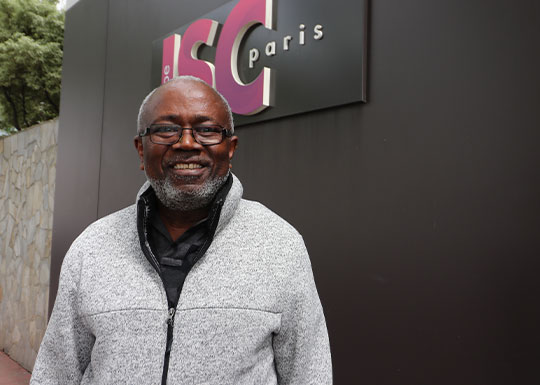

Paris Campus
As the world faces the urgent need for climate action, the role of individuals in reducing pollution and protecting the environment has become more crucial than ever. We spoke with experts and advocates who shared their insights on how individuals can make a difference in addressing climate change. From raising awareness and education to implementing sustainable solutions and promoting global collaboration, here are some creative ideas from the interviews with Professor Jamila Alaktif and her students.
Climate change is a global crisis that impacts every aspect of our lives, from the food we consume to the air we breathe. In today’s world, raising awareness about the profound impact of climate change on our daily lives and the urgent need for sustainable practices and technologies has become more crucial than ever. Education is a vital first step in addressing this issue, as many people need to be made aware of the severity and long-term consequences of climate change.
Professor Alaktif, an advocate for ecological awareness and climate migration, believes that the transition to a sustainable future starts with raising awareness among individuals. She stated, “The climate transition is on everyone’s lips, but what does it mean in the lives of individuals?”. That is a very good question! Jamila Alaktif states, “Climate change is everyone’s business”. She emphasized the importance of real-life examples and cases to help understand the impact of climate change on people’s daily lives. “I am proud that students are discussing these issues that affect them directly and are changing their perspectives from seeing climate change as ‘boring’ and institutional to a profound reflection on their future prospects,” she added.
“Climate change is everyone’s business”
Jamila Alaktif
Athena Grunenberger suggests “Promote and incentivize low carbon footprints, with annual calculations by the State for tax reductions.” Ryme El-Karkoub, a student and proponent of renewable energy, also stressed the importance of educating others about the dangers of global warming and its negative impacts, stating, “We need to spread awareness about the urgent need to transition to renewable energy sources to mitigate climate change impacts.” Akram El-Bouatmani said, “I realize that I only thought of myself before this course. But now, Professor Alaktif made me realize that everything I do impacts my life and will affect my future.” Akram’s perspective shifted towards a more holistic understanding of how his actions and choices can contribute to the broader issue of climate change, thanks to the insights shared by Professor Alaktif.
Climate change is a global crisis that poses significant threats to our environment, economy, and society. The scientific consensus is clear: human activities, particularly burning fossil fuels, are the primary drivers of climate change. To combat this existential threat, it is imperative that we urgently adopt sustainable practices and technologies that reduce our reliance on fossil fuels and minimize our negative impact on the environment.
“We need to adopt sustainable practices and technologies to address climate change effectively,” stated Hugo-Erdi Duran. “Implementing tolls at the entrance of cities to discourage car usage and reduce emissions, as well as reducing imports of out-of-season fruits and vegetables, can be effective measures,” he proposed. Omar Guezzar highlighted the importance of the 3 R’s (reduce, reuse, recycle), conserving water and promoting green spaces. Reda Anmili, a student advocate for sustainable living, suggested incorporating renewable energy sources and green spaces into urban landscapes, using electric planes to reduce emissions from air travel, and promoting sustainable fashion, stating, “We need to make sustainable choices in our everyday lives to mitigate the impacts of climate change.” Athena adds, “we need to convert CO2 emissions (pollution) into a viable energy source and equip all illuminated billboards with solar panels to harness solar energy for powering the billboards.” Sandra Bassinga states that “Using drones to create artificial rain and growing crops in deserts, such as trees, could be innovative solutions to address climate change in regions like Africa where rainfall is scarce”. These approaches have the potential to provide much-needed water for agriculture and mitigate the impacts of drought, contributing to increased food production and improved livelihoods in these areas. According to Maelys Sebene “Implementing the creation of river tanks and oases in the Sahara desert, along with land restoration and improved agricultural production techniques, could have a significant positive impact on addressing climate change.“ As for Samy Saddoun, he is fascinated by the potential of the process of “turning pollution into Ink” which involves converting polluted air into powder, which can then be treated with solvents to become ink.
Ecological transition requires collaborative efforts to find effective solutions. By working together, leveraging innovation, and advocating for sustainable practices, we can address these critical issues and create a better future for our planet and future generations.
“Pollution and climate change are global issues that require global solutions,” emphasized Professor Alaktif. “Collaboration among governments, industries, communities, and individuals is essential in addressing the multifaceted challenges posed by climate change.” She further emphasized the need for interdisciplinary approaches, where scientists, policymakers, economists, social scientists, and communities come together to find holistic solutions.
Innovation also plays a crucial role in addressing climate change. “We need to invest in research and development of sustainable technologies, such as renewable energy, energy-efficient transportation, and carbon capture and storage,” said Reda. “Innovation can drive the transition towards a low-carbon economy and help mitigate the impacts of climate change.”
Advocacy is another critical component of addressing climate change. “We need to raise our voices and advocate for policies and measures that promote sustainability and protect our environment,” stated Hugo-Erdi. This includes advocating for renewable energy policies, sustainable agriculture practices, conservation efforts, and climate change adaptation strategies. Students like Ryme are taking action by organizing events, campaigns, and educational initiatives to raise awareness and advocate for sustainable practices in their communities.
It is clear that awareness, education, collaboration, innovation, and advocacy are imperative in addressing this global crisis. We must come together as individuals, communities, governments, and industries to implement sustainable solutions and mitigate the impacts of climate change.
Professor Alaktif believes that education is key to building a sustainable future. “We need to prioritize education and awareness about climate change in our schools, workplaces, and communities,” she emphasized. “By empowering individuals with knowledge and understanding, we can inspire them to take action and make sustainable choices in their everyday lives.”
“By empowering individuals, we can inspire them to make sustainable choices.”
Jamila Alaktif
Education and awareness can transform perspectives and inspire action. Their innovative ideas and advocacy efforts are driving positive change and contributing to building a sustainable future for all.
In conclusion, climate change is an urgent global crisis that requires collective action. From awareness to action, we must prioritize education, collaboration, innovation, and advocacy to address climate change. By working together and implementing sustainable solutions, we can build a more sustainable future for ourselves and future generations. It’s time to act now, for the clock is ticking on our planet’s climate.